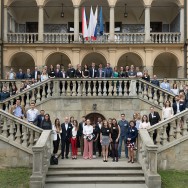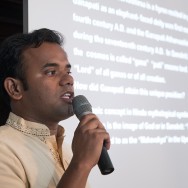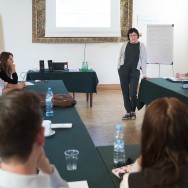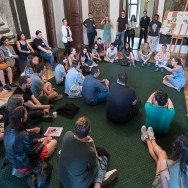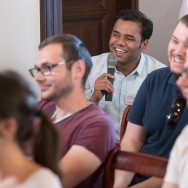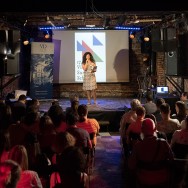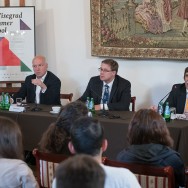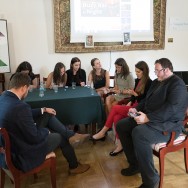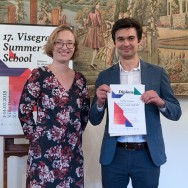multiCOOLtural Garden Party is one of the funniest evenings during each VSS. All participants get a chance to show their country however they want :) We learn about each other, about how different and how similar we are at the same time. During 17 VSS, we tasted choclates from each 14 countries, sang songs from Hungary, danced Goergian dance, got blessed for luck in Indian way, discovered what is Russia (by online referendum) and laughed a lot from our countries' stereotypes (socks and sandals ).
).
MultiCOOLtural Evening is not only an integration event, above all it serves to cultural education of our brilliant guests - especially if it's raining and you have to talk and have fun with everone in one place!
This years projects were extremly ambitious. They varied from travel apps, news estimating apps, Central Europe's news research plan, sexual and reproductive health education diagnose & improvement project to pamphlet for national stereotypes.
Each of the project needed lots of work and engagement. This is how it looked.
July 6
Projections & Perspectives
10.00-11.30 "European frameworks of collaboration in the academic, entrepreneurship and cultural fields" by: Hélène Seigneur
12.00-13.30 More than "Nice-to-have"- tasks and instruments of cultural relations and education policy by: Karoline Gil
15.00-18.00 Not only migration. Modern state - its structure and issues. The game workshop. by: Iwona Pisarska
July 5th
Disruption vs. Stability – flexible business
10.00-11.30 Media, Business & Politics - mutual relations within Region by: Václav Štětka
12.00-13.30 Strategic security challenges of global players by: Karol Szyndzielorz
15.00-16.30 Respublica: New Europe 100 by: Jenda Perla, Wojciech Przybylski, Magda Jakubowska, Tomasz Kasprowicz, Szilvi Koleszar, Adela Zabrazna
What is the role of art in the age of increasingly rising violence? How artists from all over the world can confront violence in all its embodiments: domestic and international, warlike and related, to social exclusions of all kinds? Is art not only able to resist, but also to change something?
Answers to those questions were articulated by two persecuted writers: Kholoud Charaf and Sari Al Hassanat, who have come to Poland within the framework of the International Cities of Refuge Network (ICORN) to its two Polish member cities: Kraków and Gdańsk. ICORN is a network of cities that offer shelter to writers, musicians and artists persecuted for their creative output, while actively promoting human rights and the values of freedom of expression and personal safety / well being.
The discussion was mixed with a poetry reading by our guests, accompanied with the music by Wassim Ibrahim, a Krakow-based composer of Syrian origin, who was the host of the event. The program included also a showing of a short movie by Umar Abdul-Nasser, an ICORN resident staying in Wrocław (also a member city of the network).
July 4
IN /dependent Academia
10.00-11.30 Introduction to Central Europe by: Michal Vašečka
12.00-13.30 The Journey to Youth Radicalization by: Viera Zuborova
15.00-16.30 Scholars At Risk by: Rose Anderson
July 3
IN/dependence
10.00–11.30 European Union of states. Between independence and sovereignty. by: H.E. Pavel Fischer, Michal Vašečka, Zdzisław Mach
12.00–13.30 Poland & USA - geopolitical context of relations by: Thomas Zia
14.30-15.00 Workshops introduction by: Aleksandra Przegalińska, Danuta Glondys, Marta Warat, Agnieszka Król
15.00–19.00 Idea evolution - design thinking & creativity Off school: by: Julia Święch, Grzegorz Święch
July 2
Inauguration
10.00 Opening of the 17. Visegrad Summer School by: Dominika Kasprowicz Ryszard Tadeusiewicz
10.30-11.45 World of Yesterday and Global Disorder. Where is the Path for the Young? by: Pavel Fischer
12.00-13.30 Cultural Diplomacy within Visegrad Group and the Region - debate by: H.E. Ivan Jestřáb, Adrienne Körmendy, Adrián Kromka, Leszek Hensel, Moderator: Krzysztof Bobiński
15.00-18.30 Integration workshop by: Natalia de Barbaro
Speaking of how brilliant the project ideas were, you can take a glimpse of how the presentations looked like.

